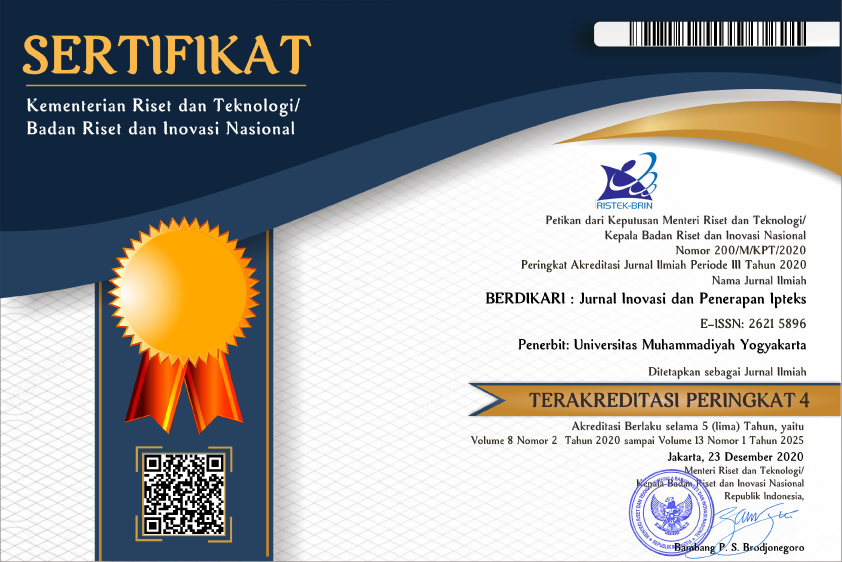Pemilahan Sampah: Satu Tahap Menuju Masyarakat Mandiri Dalam Pengelolaan Sampah
Abstract
Addressing the problem of waste management using the principle of Collect-Transport-Dump (Kumpul-Angkut-Buang) is no longer relevant since it does not solve the source of the problem that is the generated waste from household. As the highest waste generator, household waste management is crucial to reduce the waste volume dumped in the landfill. This means that active participation from the community is a must in waste management and for the community to know how to sort the waste and be able to do it is a necessity. The community service discussed in this article is one of the efforts to improve community capacity in Dusun Sruni, Cangkringan Sub-district, Sleman Regency, Yogyakarta in managing the waste generated from their household by adapting the self-managed waste management well implemented in other cities in Indonesia. The steps implemented in the com-munity service as well as the expected results are described in this article. The findings on the potential problems in educating the community-based waste management as well as futher plans activities to the sustainability of the waste management are also discussed in this article.
Keywords: waste management, community participation, community-based waste management
Full Text:
PDFReferences
Aji, Mukti. (2008). Sistem Pengelolaan Sampah Terpadu. Diakses dari http://mukti-aji.blogspot.co.id/2008/05/sistem-pengelolaan-sampah-terpadu.html, 11 April 2018.
Canadian Council on Learning. (2008). Lessons in Learning: The Benefits of Experiential Learning. Diakses dari http://en.copian.ca/library/research/ccl/ benefits_learning/benefits_learning.pdf, 11 April 2018.
Irawan, Bagus. (2018). Kelola Sampah Mulai Dari Rumah. Opini Tribun Jateng. http:// jateng.tribunnews.com/2018/02/26/opini-kelola-sampah-dimulai-dari-rumah. Diakses 11 April 2018.
Gentry, J. W. (1990). Guide to business gaming and experiential learning. Nichols/GP Pub.
Gotame, Manira. (2012). Community Participation in Solid Waste Management in Kathmandu. A thesis of Department of Geography, University of Bergen, Norway.
Muller, M & Hoffman, L. (2001). Community Partnerships in Integrated Sustainable Waste Management. The Netherlands: WASTE. Diakses dari http://www.waste.nl/sites/waste.nl/ files/product/files/tools_compart.pdf, 11 April 2018
Undang-Undang Republik Indonesia Nomor 18 Tahun 2008 Tentang Pengelolaan Sampah.
Utami, B. D., Indrasti, N. S., & Dharmawan, A. H. (2008). Pengelolaan Sampah Rumahtangga Berbasis Komunitas: Teladan dari Dua Komunitas di Sleman dan Jakarta Selatan. Sodality: Jurnal Transdisiplin Sosiologi, Komunikasi, dan Ekologi Manusia. Hal. 49-68.
http://nasional.republika.co.id/berita/nasional/ daerah/17/03/15/omv2sg319-setiap-hari-indonesia-produksi-sampah-65-juta-ton
https://news.idntimes.com/indonesia/indianamalia/ volume-sampah-2018-diprediksi-mencapai-665-juta-ton-1/full
DOI: https://doi.org/10.18196/bdr.6245
Refbacks
- There are currently no refbacks.

This work is licensed under a Creative Commons Attribution 4.0 International License.
__________________________________________________________________
Contact us: BERDIKARI : Jurnal Inovasi dan Penerapan Ipteks, Address: Gedung D, LP3M UMY, Alamat: Jl. Brawijaya, Tamantirto, Kec. Kasihan, Bantul, Daerah Istimewa Yogyakarta 55183. Email: berdikari@umy.ac.id

Ciptaan disebarluaskan di bawah Lisensi Creative Commons Atribusi 4.0 Internasional.



